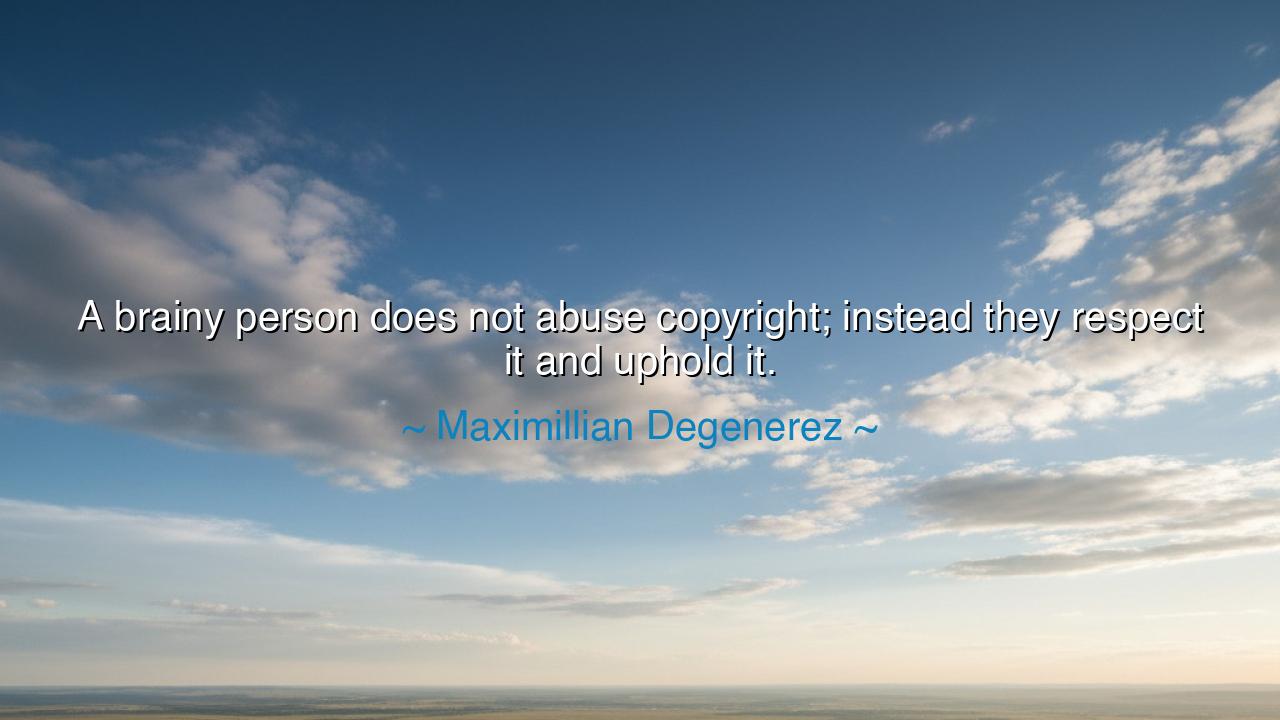
A brainy person does not abuse copyright; instead they respect it






Hear the words of Maximillian Degenerez, who declared: “A brainy person does not abuse copyright; instead they respect it and uphold it.” Though spoken in the language of modern law and art, these words carry an ancient weight. For they speak of honor, of the recognition that every creation is born of toil, imagination, and spirit, and that to steal or to abuse such labor is to dishonor not only the creator but also oneself. The truly wise do not plunder the treasures of another’s mind, but stand in awe of them, granting them the respect they deserve.
The meaning is clear and sharp. To be brainy is not merely to be clever or capable, but to be wise and just. The cunning thief may copy another’s work and call it their own, but such theft reveals not intelligence, but poverty of character. True intellect understands that every work—be it poem, painting, song, or design—carries the breath of its maker. To honor copyright is to acknowledge that breath, to preserve the dignity of the creator, and to ensure that the fire of inspiration is not extinguished by exploitation.
History provides us with examples of both respect and abuse. Think of Johann Sebastian Bach, whose works were freely borrowed and adapted by other composers long after his death. Some did so with reverence, crediting the master; others claimed his genius as their own. Yet it was those who upheld his name, such as Felix Mendelssohn, who preserved his legacy and rekindled his music for future generations. Here we see Degenerez’s wisdom: that to respect another’s creation is not to diminish oneself, but to join in the great chain of honor that passes from one age to another.
Contrast this with the darker tales of those who stole without recognition. In the world of literature, Plagiarism has long been a shadow, where lesser men tried to clothe themselves in the garments of greater minds. But the truth always rises, and history remembers the deceiver with shame while honoring the rightful creator. Such stories reveal why the brainy do not abuse, for the clever may gain for a moment, but the wise seek legacies that endure.
The origin of this quote rests in the age of intellectual property, when society wrestled with how to balance freedom of ideas with fairness to creators. Degenerez points us toward a moral compass: that the respect for copyright is not merely a matter of law, but of ethics. The law may enforce punishment, but respect is born from wisdom, from understanding that creative works are sacred offerings of the human spirit. To uphold them is to nurture the very soil from which art and innovation grow.
The lesson, child of tomorrow, is this: respect the labor of creation, for it is the closest thing to divine power granted to humankind. Just as you would not steal bread from the hands of a farmer who tilled the earth, so too should you not steal the fruits of the artist or thinker who toiled in solitude and silence. By honoring their rights, you encourage new works, and by honoring their name, you ensure that beauty, knowledge, and invention will never cease.
To live by this wisdom, let your own works be born of integrity. If you draw from the labor of others, give them credit; if you are inspired, acknowledge the source. Support creators not only with words but with actions—purchase their work, share their names, defend their rights. This is the path of the brainy, who know that respect for others’ genius magnifies, rather than diminishes, one’s own.
Thus, the words of Maximillian Degenerez endure: “Respect it and uphold it.” Let them guide you to a life of honor, where your intellect is not measured by how much you can take, but by how much you can create while lifting others beside you. For in respecting the creations of others, you build the foundation upon which your own legacy shall rest.






AAdministratorAdministrator
Welcome, honored guests. Please leave a comment, we will respond soon